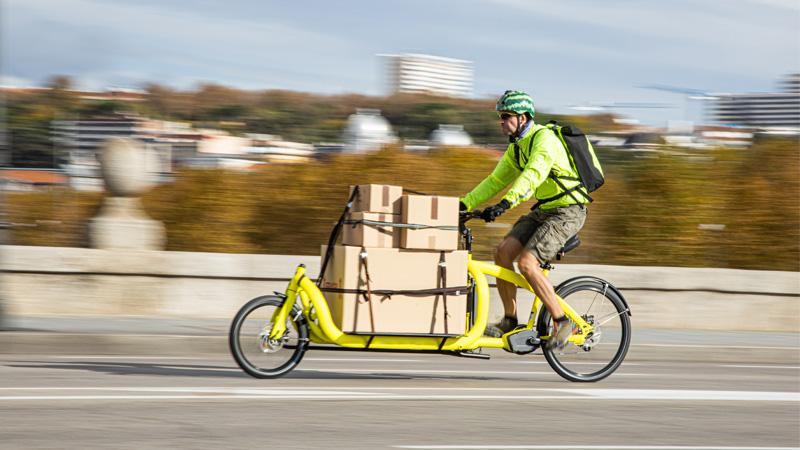New research led by Dr Ersilia Verlinghieri, Senior Research Fellow at the Active Travel Academy, suggests that the use of cargo bikes for deliveries in London and other cities will help to cut pollution and congestion.

Freight transport across the globe contributes significantly to climate change and the ongoing climate crisis. For example, in urban areas, delivery vehicles contribute to the deteriorating quality of public space, air quality and the safety of other road users. Researchers at the University of Westminster used GPS data to compare routes taken by cargo bikes in London with routes that vans would have to take to deliver the same parcels. Results show that services provided by cargo bikes in London are 1.61 times faster than that performed by van, which in a year saves over 14,500kg of CO2 and over 20kg of NOx.
In central London, cargo bikes also had a higher average speed than vans, delivering nearly seven parcels an hour compared to four for vans. These bikes also cut carbon emissions by 90% compared with diesel vans, and 33% compared with electric vans. As a result, cargo bikes can serve customers more effectively than vans without generating many of the negative effects on climate produced by urban freight.
Outside of London, the researchers also noted that 100,000 cargo bikes have been introduced in Europe between 2018 and 2020, producing an approximate monthly saving of the same amount of CO2 needed to fly 24,000 people from London to New York and back.
In the report, the researchers also suggest a number of recommendations for supporting the expansion of cargo bike freight in London and improving the safety of roads in the city. For example, they suggest that national government should create a consistent and clear strategy in support of urban non-motorised freight distribution, including the presence of segregated and wide bike lines and long-term investment in cycling provision. They also suggest that governments should standardise insurance procedures and safety regulations, such as accrediting the safety training courses provided by some companies.
Through the use of cargo bike delivery services across London, Europe and beyond, in combination with local services such as local organic food production can inspire customers to buy overall more sustainable and affordable goods. Having recognised the potential for sustainable freight, the researchers highlight that there is still much to be done both at regulatory and provision level to ensure these options are used to their highest potential.
Talking about the new report, Lead Researcher Dr Ersilia Verlinghieri said: “Thanks to the availability of GPS cargo bikes data, we had the great opportunity to develop one of the first detailed simulations comparing actual cargo-bikes’ with vans’ routes. The results highlight the great potential that cargo bikes can have in helping cities responding to the myriad of challenges they are facing. From tackling transport carbon emissions to reducing the negative health impacts of urban motor traffic, cargo bikes can be of assistance whilst simultaneously improving delivery times in densely populated areas”.
The study was funded by Possible, a UK-based climate charity working towards a zero-carbon society. The analysis was written as part of the Car-Free Megacities project funded by the KR Foundation, while e-cargo logistics company Pedal Me provided the data used for analysis.
Read the full report on the Possible website.


